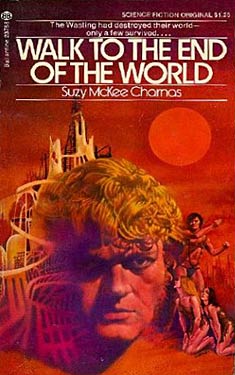Suzy McKee
Charnas
Completed 6/22/2020,
Reviewed 6/22/2020
3 stars
This is the
first dystopian novel I’ve read in a long time where men dominate women. And it’s the first one I’ve read from the
point of view of the men. It takes place
many years after nuclear war and women are treated as property, slaves, and
even as pets. It’s disturbing as hell. Unfortunately, the message was lost in the writing
style of the book; it was non-stop exposition.
I continually lost the plot because either a character or the third
person omniscient narrator always seemed to go back in time to explain some
aspect of a character’s life or some point in the history of how the world got
to this point. Nonetheless, this book
plus its sequels, together known as “The Holdfast Chronicles”, is in the Gaylactic
Spectrum Hall of Fame. This book plus its
first sequel, together known as “The Slave and the Free”, won an Otherwise
Award (formerly known as the Tiptree Award) retrospective honor.
 The plot is
fairly simple. In the future white men
dominate a nearly barren world. Women,
called “fems”, are kept as slaves or pets.
All other racial and ethnic minorites had been wiped out shortly after
the nuclear holocaust. The men are divided
into boys, Juniors, and Seniors with a strict hierarchy meant to keep peace
amongst themselves. Servan, a rebel Junior,
and a captain who refuses to integrate into the Seniors, take a third man,
Eykar, another Junior, to find his father.
It is a rule that fathers do not know their sons and vice versa because
of the belief in inter-generational war.
They are trying to find Eykar’s father because he believes he is trying
to kill him. On the way, Alldera, a fem,
is acquired and accompanies this trio. Through
this journey, this crazy world unfolds in horrific ways.
The plot is
fairly simple. In the future white men
dominate a nearly barren world. Women,
called “fems”, are kept as slaves or pets.
All other racial and ethnic minorites had been wiped out shortly after
the nuclear holocaust. The men are divided
into boys, Juniors, and Seniors with a strict hierarchy meant to keep peace
amongst themselves. Servan, a rebel Junior,
and a captain who refuses to integrate into the Seniors, take a third man,
Eykar, another Junior, to find his father.
It is a rule that fathers do not know their sons and vice versa because
of the belief in inter-generational war.
They are trying to find Eykar’s father because he believes he is trying
to kill him. On the way, Alldera, a fem,
is acquired and accompanies this trio. Through
this journey, this crazy world unfolds in horrific ways.
The book is
told sequentially from four perspectives, that of each of the above four
characters. First, it’s told from the captain’s
POV, then from Servan’s, then Eykar’s, and finally from Alldera’s. But really, it’s about the lives of the men
in this terrible world. Boy children,
cubs, are taken from fems at birth and put into what amounts to orphanages
where they are taught the culture and protocol of this men’s world. Later as Juniors, they work for a corporation,
though we don’t really know much about that.
Then as a Senior, they have more control over direction of society. Relationships are between men and only allowed
between those of the same group. There
are to be no inter-generational relationships, although they do occur between
Juniors and Seniors. Sex with fems is
not necessarily forbidden, but a man can accuse a fem of bewitching him and
have her burned at the stake. Even though
the three men in our group are very much products of this society, they are
basically outsiders due to the damage they suffered as children and as
Juniors.
We do get a
lot of scenes depicting the abuse of the fems and a sense of their daily life
through the travels of the group. The
suffer all forms of abuse: physical, emotional, and sexual. It’s all deplorable, but it’s mostly
indirect, since it’s seen through the eyes of the three men for the majority of
the book. When we finally get to Alldera’s
perspective, we mostly see how she perceives the men. Towards the end, we find out that there might
be free fems living in The Wilds, but we don’t know that for sure in this
book.
I give the
book three stars out of five. This is
was not a pleasant read for me for three reasons: the treatment of women, the continuous exposition,
and the jargon. The first two, I’ve
already discussed. With respect to
jargon, there were many words used that I never fully grasped. One such word, a Rover, at first I thought
was a dog, then a guard dog, then a human guard, then some sort of sub-human
male guard. If I understood what the jargon
meant, I think I would have appreciated the world building and the prose a lot more. In fact, the prose and world building were
really quite phenomenal. But they were
lost on me because of the three problems described above. I
think this could have been four-star book if it wasn’t for these three
problems.
No comments:
Post a Comment